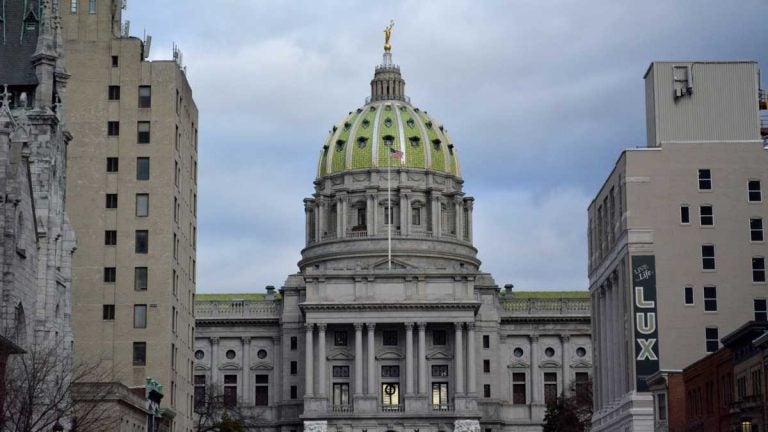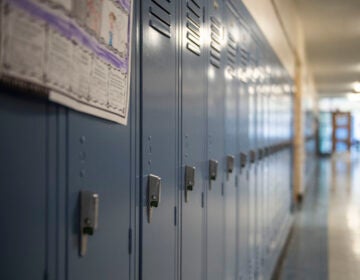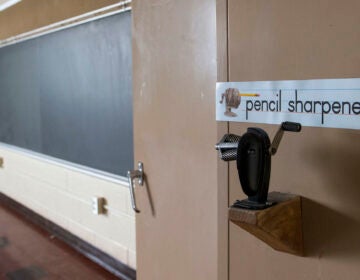

A constitutional change before Pennsylvania voters could lower property taxes and shake up school funding. Or it could do nothing at all.

Listen 0:00
On November 7, Pennsylvanians will vote on a proposed constitutional amendment that could lead to lower property taxes and radically remake how the commonwealth funds its schools.
Or the amendment could pass and change nothing.
It’s an odd juxtaposition: the proposed amendment might have drastic consequences, but is so laden with what-ifs that even political insiders and policy wonks don’t yet know what to make of it.
“We don’t have a really strong position on this because we could see good things coming out of it and we could see bad things coming out of it,” said Marc Stier, director of the Pennsylvania Budget and Policy Center, a liberal-leaning think tank.
Big picture, the amendment would give legislators unprecedented leeway to reduce or eliminate property taxes. The amendment does not, however, compel legislators to do anything. State lawmakers would have to pass a new law — or set of laws — to take advantage of the possibilities opened up by the proposed amendment.
And it’s unclear what those proposals would be.
Crucially, the amendment would allow lawmakers to make a distinction between residential and commercial properties.
Right now, school districts can reduce residential property taxes by 50 percent thanks to a previous constitutional amendment approved in 1997. If they went any further they’d violate the state’s constitutionally inscribed “uniformity clause,” which requires all classes of income to be taxed at the same rate unless there’s a specific exemption.
One of the things the legislature could do if the amendment passes is eliminate property taxes solely on residences and farms, not businesses. In that scenario, any lost dollars would have to be replaced by some other form of revenue, likely state income or sales taxes.
Some backers of the amendment laud this possibility. They see it as a promising move toward the total abolition of residential property taxes, which a growing fringe of activists and lawmakers have been pushing for years.
“This referendum question is a big step in that direction,” said State Senator David Argall (R-Schuykill County), who sponsors legislation that would completely eliminate school property taxes and replace local revenue with a statewide sales-tax hike.
Argall’s bill fell a vote shy of passing the Senate in 2015. But because the amendment will allow any future bills to make distinctions between residential and commercial property taxes, Argall believes former skeptics can be converted.
“If we tried to eliminate property taxes today, under the terms of the constitution, we’d have to do it for everyone,” he said. “What we’re trying to focus on are the people most in jeopardy of losing their homes to escalating property taxes.”
Local property taxes provide about $12.6 billion annually to Pennsylvania schools — about 41 percent of the total spent on K-12 education, according to a previous Keystone Crossroads analysis.
Argall and other anti-property-tax advocates argue the reliance on this levy harms homeowners, especially seniors whose stagnant incomes often cannot match rising tax rates.
“The school property tax is unfair,” said Argall. “It’s based on my ability to buy a house 10, 20, 30, 50 years ago. It’s just not a good way to fund the public schools.”
Across the commonwealth, many school districts have felt pressure to continually hike local property taxes. Pension and healthcare costs have been rapidly rising, and the state’s school funding scheme, rooted in “hold harmless” logic, has burdened some districts where enrollment has grown. As a result, many homeowners feel squeezed.
But, from the perspective of schools, there are crucial advantages to the property tax. For one, it’s a more reliable source of revenue than something like a sales tax, which can fluctuate suddenly amid economic changes. It also allows greater local autonomy in school funding without leaving districts at the mercy of state decision makers.
If the passage of the amendment does indeed open the door to Argall’s plan, critics also lament its effect on school funding equity. Argall’s proposal would lock current local school funding levels into place, which would effectively mean that some of the state’s wealthiest school districts would become subsidized by statewide taxes paid by the lesser off.
Meanwhile, even with the bulk of school funding moving through Harrisburg under that scenario, poorer districts would continue to struggle under a system which does not match resources with need.
“It’s clearly wrongheaded,” said Donna Cooper, executive director of Public Citizens for Children and Youth and an opponent of the proposed amendment. “We should be looking to reduce property taxes for those who are most stressed and increase the state share of funding for our schools so that we decrease the pressure on homeowners.”
Cooper says the state could work within the existing framework to reduce the property tax burden on vulnerable homeowners. She pointed specifically to the property tax rebate program, which reimburses older, low-income Pennsylvanians. Cooper would rather expand that initiative than pass an amendment that could strengthen the logistical and political position of anti-tax reformers.
“I see this as part of the long march that the property tax abolition community has been attempting to move forward for the last 15 years,” she said.
Stier, of PBPC, called Argall’s plan “the craziest piece of legislation I’ve heard of in 10 years of political activism and 25 years of teaching political science.”
But he does see potential positives in the proposed amendment that will soon go before voters. He believes the flexibility created through an exemption to the uniformity clause could allow Pennsylvania to offer more targeted help to those hemmed in by rising property tax rates.
“It might actually help some progressive legislation pass that would give directed property tax relief to people in the parts of the state where property taxes really do take too much of their income,” he said.
Stier envisions, for instance, legislation that would lower tax rates for poor and middle-income residents who spend a high proportion of their income on property taxes.
Jay Himes, head of The Pennsylvania Association of School Business Officials (PASBO), supports the amendment because it could provide the flexibility to craft novel tax-relief solutions. Even though Himes, like Stier, does not advocate total property tax abolition, he believes the amendment “gives us an opportunity to target some relief to reduce the over-reliance we have on the property tax.”
“We fall in between the status quo and the so-called elimination end of the spectrum,” he said.
About the only thing all parties agree on is that the amendment is likely to pass and that it’s passage won’t force any immediate changes.
“You won’t see anything in the short term,” Himes said. “This is not a ‘now things are gonna change tomorrow’ proposition.”
WHYY is your source for fact-based, in-depth journalism and information. As a nonprofit organization, we rely on financial support from readers like you. Please give today.
Exploring the stories that matter across the commonwealth with all Pennsylvanians in mind.

School choice vouchers could be part of the budget being negotiated in Pennsylvania. They’re controversial, and decades of studies show they have mixed results.

Jay-Z’s company Roc Nation is funding informational events to get Philadelphians on board with using taxpayer money for private school vouchers.

A proposal to boost public school funding by billions in the coming years and impose stricter rules on cyber-charter schools is on its way to the Pennsylvania Senate.
Avi Wolfman-Arent is an on-air host at WHYY and the co-host of WHYY's "Studio 2."